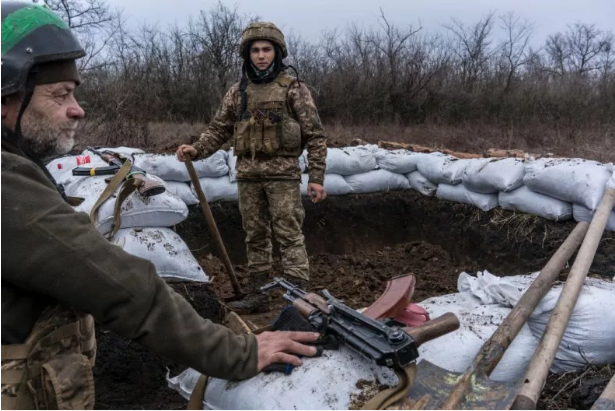…the point of diplomacy is to advance national interests by finding avenues to work together with other powers, not to continuously poke at the sore spots of another country
…Western encouchment in Ukraine will only make Russians more nationalistic and more aggressive toward Ukraine and the US.

Things are not looking good for U.S.-Russia relations. And they aren’t getting any better. Around 94,000 Russian troops are on the eastern borders of Ukraine. President Joe Biden threatened Russia with more sanctions and asserted that he will not abide by the “red lines” that Russia had established.
NATO expansion into Ukraine has been the elephant in the room, which Russian President Vladimir Putin made blatantly clear in the latest meeting between him and President Biden. But an important question needs to be asked: What, exactly, is the U.S. national security interest in Ukraine? The answer ostensibly lies in the defense of U.S. credibility.
Commenting on the current crisis in Ukraine, Toomas Hendrik Ilves and David J. Kramer claimed that making concessions to Putin and Russia would result in a lack of trust among U.S. allies toward future U.S. commitments, and would embolden Russia to continue similar aggressive behaviors.
Frederick Kagan affirmed that the use of military forces is the best way to deter Russia from taking over Ukraine. There has also been talk that not confronting Russia will amount to appeasing Putin. To paraphrase Christopher Layne, appeasement is a dirty word among U.S. foreign policymakers. Essentially, these arguments believe that the U.S. and the West must prove their mettle against Russian maneuvers on Ukraine, lest Russia be emboldened to run rampant all over other countries. But is this defense of Ukrainian sovereignty really worth going to war over for the U.S. or for NATO in general? My answer—sorry Ukrainians—is no.

These arguments about the necessity to defend American credibility do not look critically at the unintended consequences of doing so. This supposed need to prove its credibility has—and will be—a problem for the U.S. The Vietnam War is a case in point of credibility in action. At its essence, the U.S. remained in Vietnam to show its resolve to the Soviet Union to prevent the Soviets from being emboldened to challenge the U.S.
In reality, the deaths of 58,000 Americans and over 500,000 Vietnamese, the fall of Saigon in 1975 and the lack of a Soviet-led international crusade afterwards made the Vietnam War a pointless and tragic war.
A more recent example of the defense of credibility in action is the outcry against the U.S. withdrawal from Afghanistan. Critics believed the withdrawal from Afghanistan would embolden Russia and China, and allies would lose trust in American commitments. Yet, these individuals do not provide an alternative solution other than withdrawal. Were U.S. forces supposed to stay in Afghanistan indefinitely? The deaths of 2,448 U.S. military personnel, 47,245 Afghan civilians and the costs of about $2.3 trillion just for the Taliban to take over the country once again after about 20 years prove the point of the absurdness of remaining in Afghanistan.
As Robert J. McMahon made clear, the costs of the U.S. attempting to defend its credibility over unimportant commitments are not worth it.
In the case of Ukraine, these unintended consequences would likely involve more war for the Ukrainians, and an arms race between the U.S. and Russia. Let’s not forget that the U.S. and Russia are no longer in the Intermediate-Range Nuclear Forces Treaty. In fact, an increase in U.S. commitments to Ukraine would likely lead Russia to dig its heels further into the mud—a classic case of the security dilemma.
The point of diplomacy is to advance national interests by finding avenues to work together with other powers, not to continuously poke at the sore spots of another country.
Moreover, this view of Ukraine as the last stand for the U.S. against Russian aggression leaves out the responses of other countries near Ukraine—including Poland and Romania—to a possible Russian invasion of Ukraine. It is almost certain that Poland and Romania would launch a massive military buildup to counter further Russian aggression.
As Stephen M. Walt made apparent, nationalism is one of the strongest forces in international affairs. Western encroachment in Ukraine will only make Russians more nationalistic and more aggressive toward Ukraine and the U.S.
The U.S. has untapped diplomatic power to ameliorate the situation. Up to this point, U.S. policymakers have “talked the talk” on the need of Russia to stop its military build-up near Ukraine. However, given the costs to the defense of credibility, U.S. policymakers must ask themselves: Are they prepared to “walk the walk” on Ukraine? NEWSWEEK SUBSCRIPTION OFFERS >
Benjamin Giltner is a graduate student at the George H.W. Bush School of Government and Public Service. He is pursuing a track in national security and diplomacy, as well as concentrations in international politics and grand strategy, and conflict and development. The views expressed in this article are the writer’s own. SOURCE: NEWSWEEK MAGAZINE



